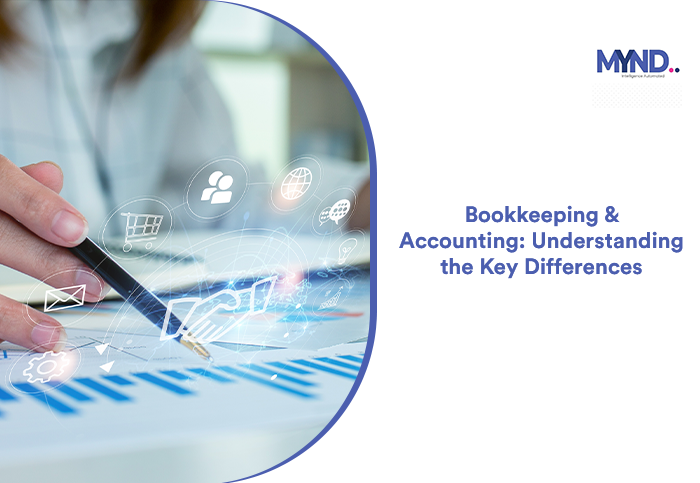Bookkeeping & Accounting: Understanding the Key Differences
Although bookkeeping and accountancy are frequently used indiscriminately, bookkeeping is the foundation for accounting. When it comes to the extent of these two operations, accounting is significantly more comprehensive and analytical than bookkeeping. Only a small portion of accounting, which serves as the foundation for accounting, is bookkeeping.
While bookkeeping places a strong emphasis on tracking transactions, the function is primarily administrative in nature. A high level of topic knowledge, expertise, analytical abilities, conceptual understanding, and other attributes are required for accounting, which is all about summing up the recorded transactions. Look at the article, which provides a table-based explanation of the distinction between bookkeeping and accounting.
Payroll, invoicing, receipts and bills, and documenting business activities are the main components of bookkeeping. Contrarily, accounting often includes the preparation of budgets, tax returns, financial statements, and reports, as well as the analysis of business performance.
Bookkeeping vs. Accounting
The following are the distinctions between bookkeeping
and accounting:
|
Bookkeeping |
Accounting |
|
The basis or core of accounting is
bookkeeping. |
Accounting creates financial reports and
statements using the data provided by bookkeeping. |
|
One component of the entire accounting
system is bookkeeping. |
Unlike bookkeeping, which has a more
limited scope, accounting begins where bookkeeping concludes. |
|
The process of bookkeeping produces data
that is used in accounting. |
Accounting produces financial statements
that can be used to make responsible decisions. |
|
Maintaining a regular, chronological
record of financial operations and transactions is the goal of bookkeeping. |
Accounting is used to compile
information on a company's operating performance and financial health. |
|
A business's financial transactions for
a specific time period are summarized by its bookkeeping system. |
Accounting's goal is to comprehend and
analyze financial data so that users may make wise decisions. |
|
A bookkeeper is an individual in
charge of maintaining the books. |
The term "accountant" refers
to the person in charge of accounting. |
|
Bookkeeping is mostly a clerical task.
There are no specialized skills or knowledge needed for bookkeepers. |
Accounting calls for the expertise of an
accountant as well as familiarity with numerous accounting procedures and
principles. |
|
The process of bookkeeping does not
include financial statements. |
The accounting procedure results in the
preparation of the financial reports and statements. |
|
The bookkeeping procedure complies with
accounting principles and practices. |
Different entities may have different
accounting practices and approaches to understanding and analyzing financial
reports. |
In-depth understanding of Bookkeeping & Accounting
Bookkeeping:
Bookkeeping is the procedure through which a bookkeeper thoroughly and
consistently records the financial transactions of an organization. It is the
process of maintaining thorough records of each and every financial transaction
made by the company to serve as a foundation for financial accounting. To
accurately depict income and expenses at the conclusion of the accounting
period is the goal of bookkeeping. The bookkeeper is tasked with keeping accurate
records of all day-to-day business activities, including the receipt and
disbursement of cash, the sale or purchase of items on credit, expenditures
incurred, etc. The trial balance is created when the bookkeeper records the
transactions in the daybooks, such as purchases, sales, purchase returns, sales
returns, cash books, journals, etc., and publishes them in the relevant ledger.
There are two ways to keep books:
·
Single Entry
· Double Entry
Accounting: Accounting is only a sort of corporate communication that communicates details about an organization's financial situation. This comprehensive process begins with the transaction recording and concludes with the filing of the income statement at the conclusion of the fiscal year. A company's financial transactions are identified and methodically recorded in accounting, after which they are grouped—i.e., the transactions with similar characteristics are put into a single group—and finally encapsulated in a way that can be shown to the investors and other users of the financial statement. Following this, the financial statements will be thoroughly analyzed, aiding in the interpretation of the findings and informing the interested parties of the outcomes of the financial statements. The goal of accounting is to give its users—investors, employees, creditors, suppliers, managers, the government, and the general public—a true and fair perspective of the financial statements for a specific fiscal year in a way that is understandable to them. The wealth, profit, and financial condition of the entity are detailed in the financial statement that was created with the aid of accounting. There are several types of accounting: Financial, cost, management, human resource, and social responsibility accounting.
A firm of any size can achieve its primary objectives
with the help of reliable accounting and
bookkeeping services. An effective department may offer a significant
risk to the expanding corporation, and maintaining one becomes an expensive
endeavor. Accounting services are provided by Mynd Integrated Solutions on a
scalable basis to meet every accounting demand, from GL accounting through
finance controllership activities. Mynd's team of experts helps organizations
with business process automation, enabling them to be flexible and
future-ready.




Comments
Post a Comment